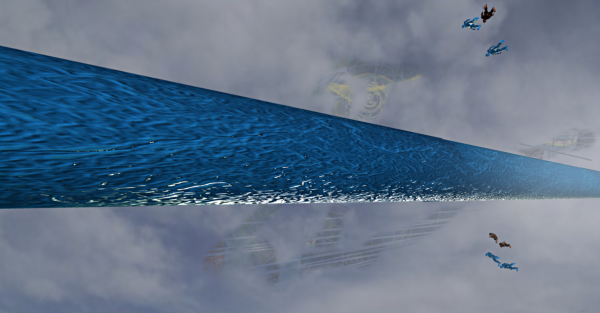BY LETTER
Aether Ring
Galactography > Places and Locales
Galactography > Civilized Galaxy - Sephirotic Empires > Zoeific Biopolity
Galactography > Civilized Galaxy - Sephirotic Empires > Zoeific Biopolity
Microgravity Niven Cloud around the Wind in the Leaves at 009 Ceti | |
 Image from Steve Bowers | |
| The Circle Sea, sometimes called the Ring River | |
The Aether Ring encircles the Jupiter Brain known as The Wind in the Leaves at a distance of 1 million kilometers. It is just over 6 million kilometers long and 3000 kilometers thick across in its minor diameter. The Ring is a small Niven cloud type habitat and primarily consists of a free-fall environment filled with air and maintained by specially designed utility fog. The outer layers of fog also incorporate weather machine technology to reflect and focus light into the interior of the Ring habitat, down to the deeper layers where atmospheric dust and gases would otherwise prevent the desired level of illumination.
The Ring itself is divided into 360 habitat segments, each hosting a different free-fall ecosystem. Like a planet, the entire Ring operates as a single continuous biome, while individual segments each replicate a somewhat different habitat, equivalent to the different eco-systems that can develop on a planet depending on local climate, available water supplies, elevation, latitude, and various other factors. In addition to the segment divisions, the various layers of the Ring interior also make up a wide range of habitats, depending on their distance from the Ring’s outer layers. The outermost layers of the Ring are much more diffuse, with both air pressure and temperature being generally lower than is comfortable for most biont clades, although a variety of tweak clades find it quite amenable. As one travels deeper into the Ring interior, both air pressure and temperature increase steadily until conditions are similar to those found on most gaian type planets or habitats.
Running down the center of the Ring is the Ring River, also known as the Circle Sea. This is a single continuous body of water, some 10km thick. Like the rest of the Ring, the Circle Sea is divided up into multiple habitats based on interior depth and location within the overall Ring itself as well as salinity levels established and maintained by interior utility liquid systems.
Scattered throughout the volume of the Aether Ring are several thousand asteroids, ranging in size from one to ten kilometers across, that were emplaced during its construction. These are used as a local source of raw materials, both by the Ring population and the ecosystem itself. Several dozen bodies also host habitation clusters, ranging in size from several thousand to tens of millions of inhabitants. Habitation clusters are generally built around a mix of hollowed out asteroids, free-fall Reefs, and various plant forms, including several species of air-adapted orwood tree.
Each segment of the Aether Ring has its own spaceport. These and a network of interior mass-beam transport links allow rapid transit across the Ring and to the wider solar system beyond.
Related Articles
Appears in Topics
Development Notes
Text by Todd Drashner
Initially published on 09 February 2014.
Initially published on 09 February 2014.






